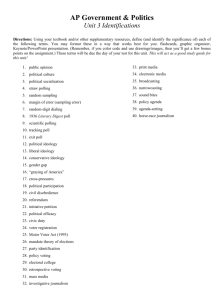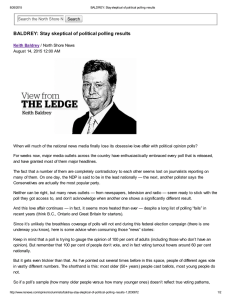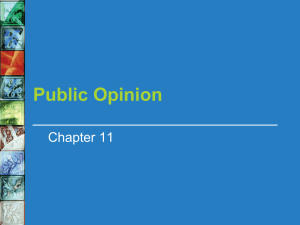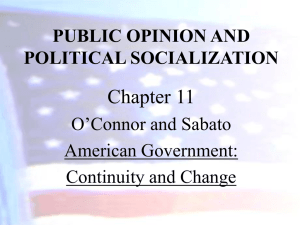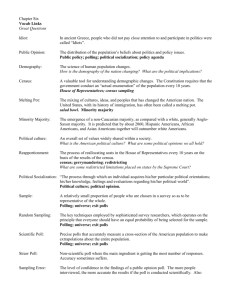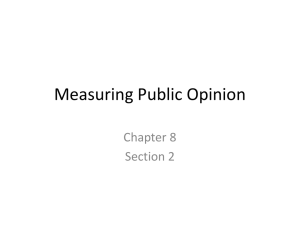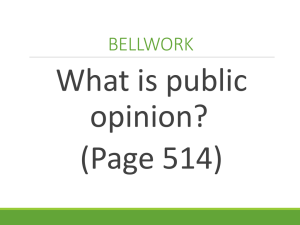Leaders Should Not Follow Opinion Polls
advertisement
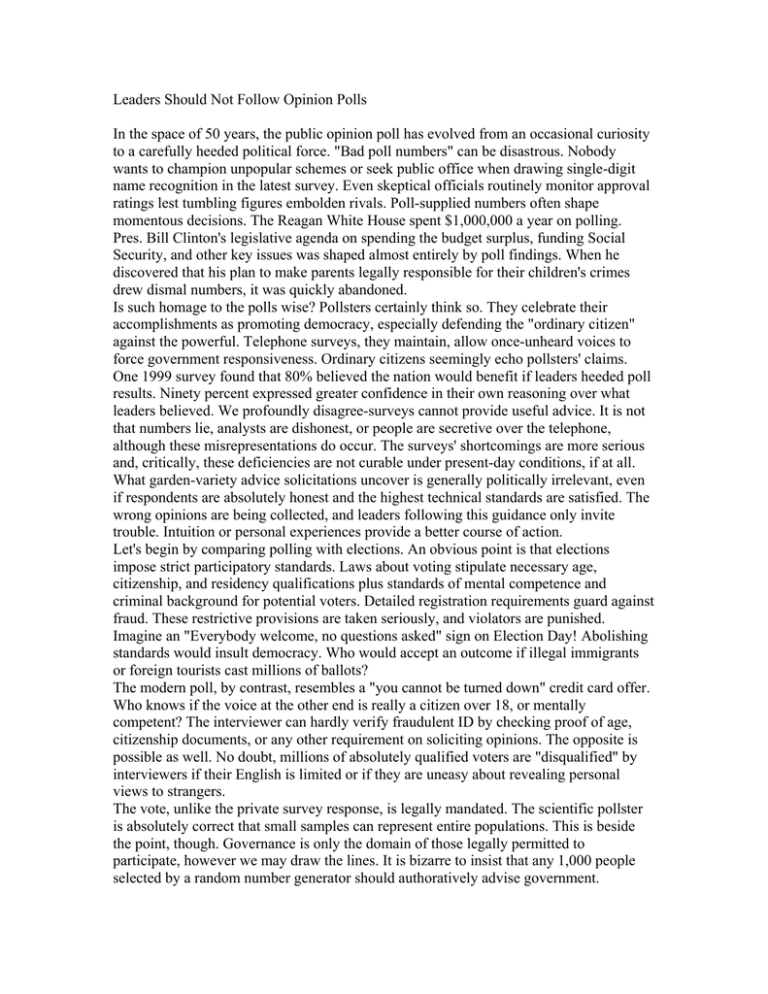
Leaders Should Not Follow Opinion Polls In the space of 50 years, the public opinion poll has evolved from an occasional curiosity to a carefully heeded political force. "Bad poll numbers" can be disastrous. Nobody wants to champion unpopular schemes or seek public office when drawing single-digit name recognition in the latest survey. Even skeptical officials routinely monitor approval ratings lest tumbling figures embolden rivals. Poll-supplied numbers often shape momentous decisions. The Reagan White House spent $1,000,000 a year on polling. Pres. Bill Clinton's legislative agenda on spending the budget surplus, funding Social Security, and other key issues was shaped almost entirely by poll findings. When he discovered that his plan to make parents legally responsible for their children's crimes drew dismal numbers, it was quickly abandoned. Is such homage to the polls wise? Pollsters certainly think so. They celebrate their accomplishments as promoting democracy, especially defending the "ordinary citizen" against the powerful. Telephone surveys, they maintain, allow once-unheard voices to force government responsiveness. Ordinary citizens seemingly echo pollsters' claims. One 1999 survey found that 80% believed the nation would benefit if leaders heeded poll results. Ninety percent expressed greater confidence in their own reasoning over what leaders believed. We profoundly disagree-surveys cannot provide useful advice. It is not that numbers lie, analysts are dishonest, or people are secretive over the telephone, although these misrepresentations do occur. The surveys' shortcomings are more serious and, critically, these deficiencies are not curable under present-day conditions, if at all. What garden-variety advice solicitations uncover is generally politically irrelevant, even if respondents are absolutely honest and the highest technical standards are satisfied. The wrong opinions are being collected, and leaders following this guidance only invite trouble. Intuition or personal experiences provide a better course of action. Let's begin by comparing polling with elections. An obvious point is that elections impose strict participatory standards. Laws about voting stipulate necessary age, citizenship, and residency qualifications plus standards of mental competence and criminal background for potential voters. Detailed registration requirements guard against fraud. These restrictive provisions are taken seriously, and violators are punished. Imagine an "Everybody welcome, no questions asked" sign on Election Day! Abolishing standards would insult democracy. Who would accept an outcome if illegal immigrants or foreign tourists cast millions of ballots? The modern poll, by contrast, resembles a "you cannot be turned down" credit card offer. Who knows if the voice at the other end is really a citizen over 18, or mentally competent? The interviewer can hardly verify fraudulent ID by checking proof of age, citizenship documents, or any other requirement on soliciting opinions. The opposite is possible as well. No doubt, millions of absolutely qualified voters are "disqualified" by interviewers if their English is limited or if they are uneasy about revealing personal views to strangers. The vote, unlike the private survey response, is legally mandated. The scientific pollster is absolutely correct that small samples can represent entire populations. This is beside the point, though. Governance is only the domain of those legally permitted to participate, however we may draw the lines. It is bizarre to insist that any 1,000 people selected by a random number generator should authoratively advise government. The electoral process is also eminently accountable and transparent. Everything about it, from ballot layout to polling locations, must pass official approval. These details may be flawed - recall the famous Palm Beach butterfly ballot confusion in the 2000 presidential election - but, for better or worse, its features are publicly controllable. If people, acting through elected officials, prefer odd-style paper ballots, this can be done. Where disputes arise - again recall the Florida Circus - they are open to public inspection, even lawsuits. In fact, the disgruntled have endlessly petitioned legislatures and judges to act, and it is inconceivable that any U.S. election official would secretly try to gain advantage without risking public reprimand. The contrast with polling is, again, enormous. Polling (with scant exception) is a private, commercial enterprise. Everything is negotiated between the paying client and the private firm, and is ultimately decided by the client. Zero public scrutiny oversees this process, and, should the public peek behind the curtain, it still remains powerless. Pollster integrity is irrelevant: public control is the issue, not professional honesty or expertise. Analysts can make unwelcome results vanish or be quietly manipulated statistically, and everything would pass professional muster. Enraged citizens cannot demand to see the questionnaire. What might happen to pollsters or clients "cooking" the results before passing them off as "the true popular democratic voice"? Absolutely nothing. Envision a Secretary of State who refused public oversight of absentee ballot validation or who utilized a mysterious formula to "adjust" the final vote count. The uproar would be deafening, and the courts would instantly (properly) intervene once a challenge came before them. Pollsters escape even the most minimal public regulation despite their lofty self-anointed public responsibilities. Barbers and hairdressers are held to higher standards. A different poll deficiency concerns the quality of this advice. Whether ordinary citizens are sufficiently wise to rule is a complicated subject, but even the most ardent popular sagacity defenders concur the average person cannot respond intelligently when unexpectedly quizzed on of issues long baffling experts. Learning about Social Security, education testing, balancing the budgets, and untold other pollster items is no small task, and to expect those suddenly picking up the telephone to be well-prepared is utter fantasy. Thoughtful firms should at least provide advance warning so information could be gathered, mail off some balanced background material, or offer on-the-spot tutorials. Alas, this service is never provided, and if some additional facts are supplied, they are merely gross simplifications of complex issues. Compounding this lack of preparation is that the questions themselves seldom permit informed respondents to render intelligent advice. By commercial necessity, modern polling produce instant results by reducing complicated, multifaceted issues to a few crude alternatives. Queries about the military budget typically focus on "increasing/decreasing/or no change" spending choices. No room exists for more sophisticated respondents who wants to cut some expenditures while expanding others. Nor does this typical question permit well-versed advice that reflects actual conditions for example, increasing spending provided a bellicose dictators remain in power, but otherwise seek reductions. Worse, this commonplace format never asks for specific dollar figures. Two people can agree on cutting Pentagon budgets, but one desires a modest $100,000,000 largely symbolic cut while the other prefers lopping off $200,000,000,000. This numerical difference is critical politically, but disappears when the public's "voice" is crudely transmitted via the poll. What makes the pollsters' celebration of poll-solicited advice especially odd is that they certainly know the public's limitations. Surveys relentlessly confirm public ignorance beyond the obvious. This is particularly true when wrestling with specific policies, even though these have long been newsworthy. Poll after poll reveals majorities poorly informed about tax rates, entitlement programs, and legislative proposals, although, to be sure, opinions on these topics are readily offered. This pessimistic assessment has less to do with innate cognitive capacity than the irrelevancy of most political debates from daily life. People pay attention to what matters and, for most of them, the topics raised by inter viewers can safely be ignored. Pollster ignorance The poll's inadequacy of providing sound advice is made even worse by pollster ignorance. Poll question writers are expert in drafting questionnaires, not the policy at hand. To expect otherwise is unrealistic given commercial survey cost constraints. Not even Gallup could hire learned experts to consult on each of hundreds of questions. The upshot is that the array of answers inevitably reflects the imperfect worldview of a policy amateur, and often an inadequate view at that. If the respondent rejects this imposed framework, or these options have little to do with actual government choices, the results no matter how honest and sincere - are politically meaningless. Irrelevant questions beget beside-the-point answers. A particularly glaring, though hardly extreme, inappropriateness example comes from a professionally executed poll asking about ending world hunger. The question was framed in terms of increasing foreign aid to cut world hunger in half by 2014. The public's response was heartfelt support (83% favored it), and programs to assist children and women were particularly popular. Even though respondents usually expressed reservations about foreign aid, most still wanted sharp increases in national generosity (boosting outlays by 10 times, no less!). On its face, then, the poll's message is clear: Washington should be more bighearted in eliminating overseas famine. What could possibly be ambiguous about this message? Plenty could be. For one, astute observers of world hunger might argue that the problem is not one of donating food for the famished. A more-daunting quandary may be convincing host governments to permit this humanitarian intervention or supplying the infrastructure necessary to promote self-sufficiency. There are also momentous political problems having little to do with airlifting wheat to famine-stricken regions - for instance, ending wars in which starvation is a military tactic. More telling, such generosity may make matters worse by destroying local agriculture and breeding permanent dependency. How can local farmers compete against free food? Genuine assistance might mean withholding food stuff while demanding the necessary political and economic reforms to prevent future catastrophes. In other words, the question writer's off-the-top-of-the-head opinions to the contrary, starvation is not really a foreign aid issue, and those who grasp this fact are totally "lost" in this survey. Our last qualm regarding poll-solicited public counsel concerns the fundamental disjunction between economic reality and the poll-supplied reality. Simply put, by rejecting economics, polls facilitate fantasy. Consider supermarket shopping. Certain absolutely inescapable facts attend this journey. First, acquiring food is not free, so better bring money, but not one's entire fortune, since there is also rent, car payments, etc. Second, though one might covet everything in the aisles, budgetary constraints may mandate picking and choosing - buying expensive T-bone steaks forgoes other essential edibles. Third, each additional item's marginal value must be calculated. Hamburger may be on sale for an incredible 69 cents a pound, but blowing every last nickel on 300 pounds of chopped beef is stupid. Finally, risk and liabilities must be appraised - skip rancid hamburger regardless of its cheap price. Polls are oblivious to these clear economic limits. When shopping for government policies via the survey, consumers are wonderfully free. When offered governmentprovided health care, more schools, assistance to senior citizens, and/or cleaner environments, the entire menu is easily purchased. Unlike the prudent shopper, the survey respondent need not fret about costs (and no bill is sent). Nobody is forced to choose among competing benefits, nor are respondents told that buying more and more may mean progressively less value received. When embracing such skyrocketing government spending, nobody remembers that 300 pounds of hamburger can be a liability. To make this gluttony even more pleasurable, dangers are banished from the poll-created universe. Respondents are not told, for example, that Washington's bounteousness toward local education may load more red tape onto already overburdened schools or distort educational objectives. Nor is anybody informed that higher taxes mean less personal choice for acquiring identical benefits. Drug manufacturers should enjoy such freedom from listing potentially dangerous side effects in advertising their panaceas. This obliviousness to inescapable economics is not a nefarious pollster plot to entice Americans to "buy" dubious government-supplied nostrums. Some analysts may welcome this benevolence given their liberal bents, but ideological bias is hardly the chief culprit. More relevant is that the modern poll, for all of its scientific paraphernalia and claims of exactitude, cannot insert credible economic checks into the standard telephone interview. Like any instrument, the poll can perform only so much. The interviewer is not the IRS, which can compel payment for desired government services. The brief telephone interview is also incapable of permitting respondents to make realistic trade-offs, calculating benefits vs. costs, and including all the other ingredients necessary for sensible decision making. While, in principle, a policy's downside can be explained, this is often impractical given typical respondent attention spans. There is also the quandary of deciding what, exactly, constitute a proposal's genuine risks, no small matter given future uncertainties. All in all, then, to expect sound advice when polling citizens about what government should do is unreasonable. Our argument has focused on a single aspect of polling - its use to solicit policy advice from ordinary citizens. Even though we believe that this invariably invites foolishness, we are not attacking polls per se. The debate concerns appropriateness. To maintain that the people, as haphazardly defined by a telephone-dialing machine and as interviewed by those beyond public unaccountability, should guide elected officials is nonsense. Moreover, no government, no matter how attentive to public opinion, can possibly satisfy a people unencumbered by the most-elementary economic constraints. These poll formulated solicitations invite bankruptcy. It would be the equivalent of turning space program over to engineers who disbelieve the laws of physics. The opinion poll's proper role is assessing public opinion. Opinions differ fundamentally from advice in their standards. Everyone has a valid opinion: not everyone can offer sound advice. If our doctor says that the Beatles were the best rock-and-roll group ever, who can argue, or even insist upon documentation? It is quite different, however, if one's physician counsels sacrificing chickens to cure pneumonia. The standards for advice are infinitely higher, and, by these tough standards, most Americans are ill-prepared to render expert snap judgments about matters of a national significance beyond their expertise. Let us not confuse flattering popular wisdom with gaining something of value.-by Robert Weissberg (Univ. Illinois)
